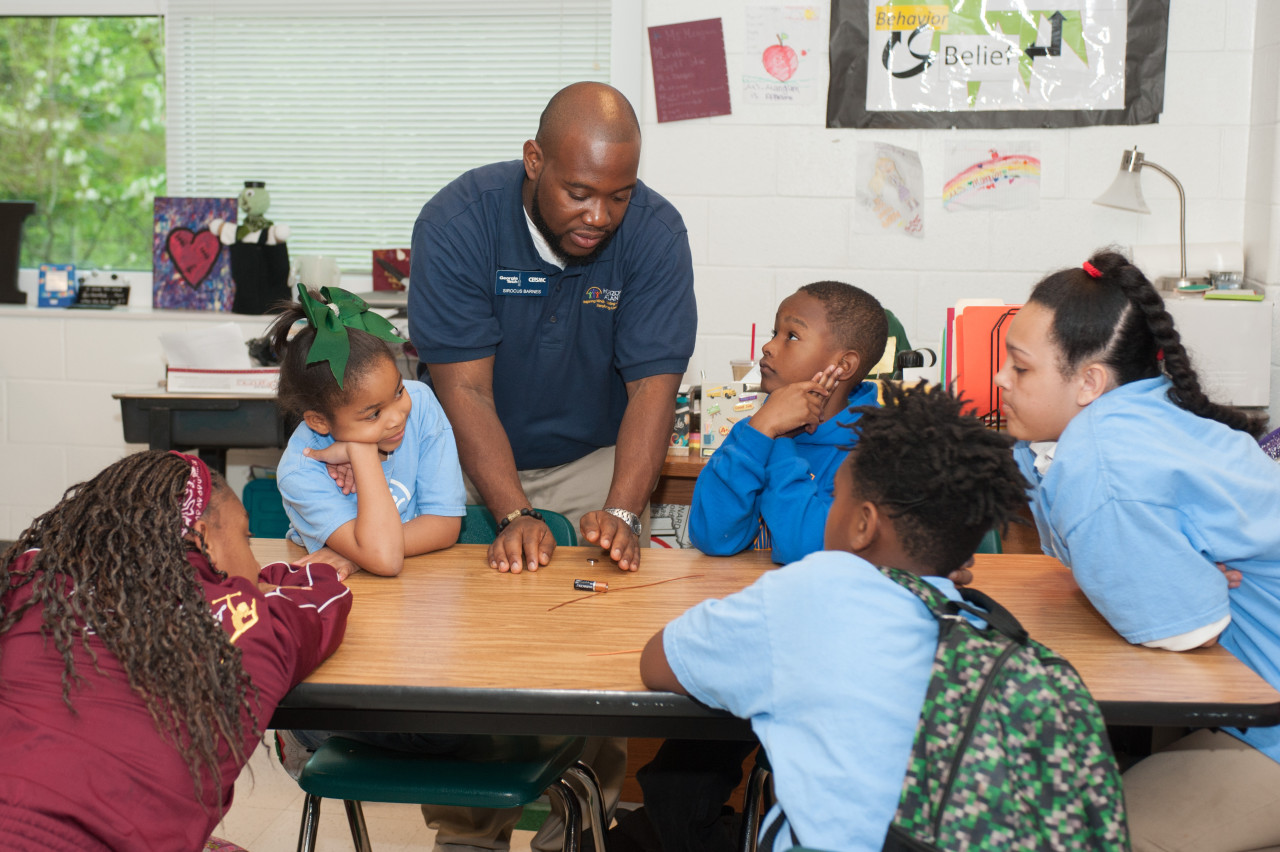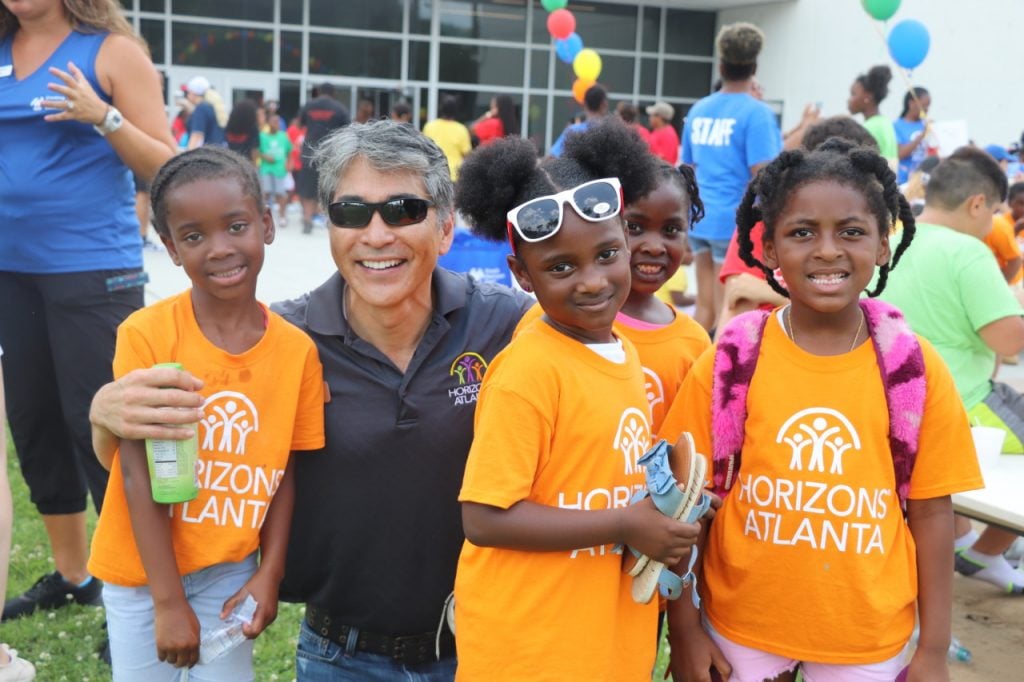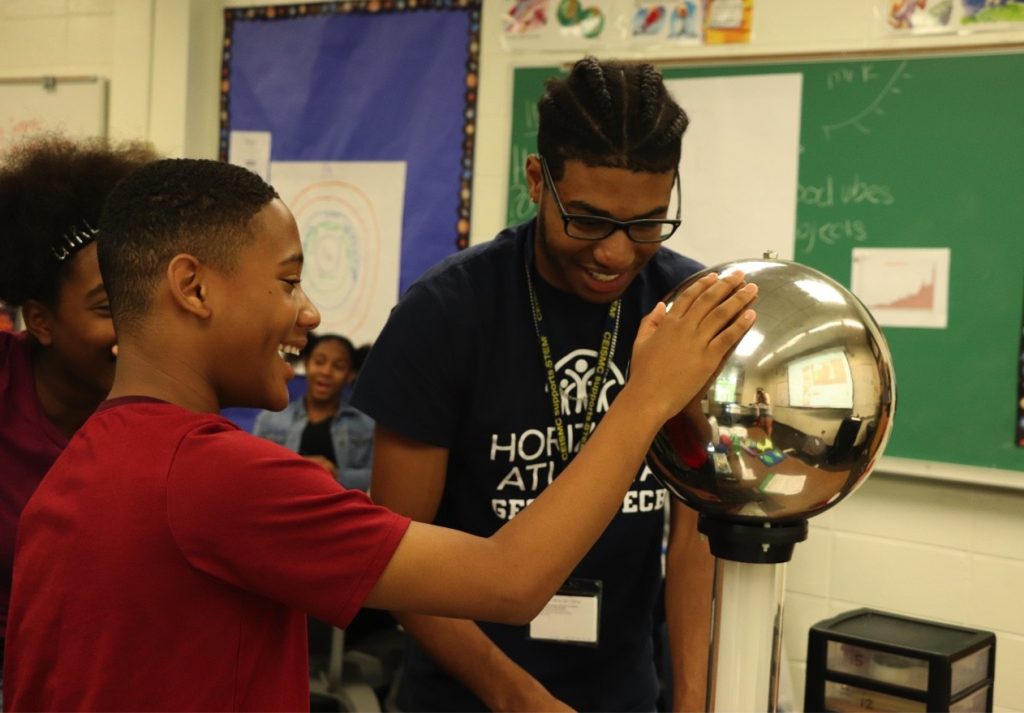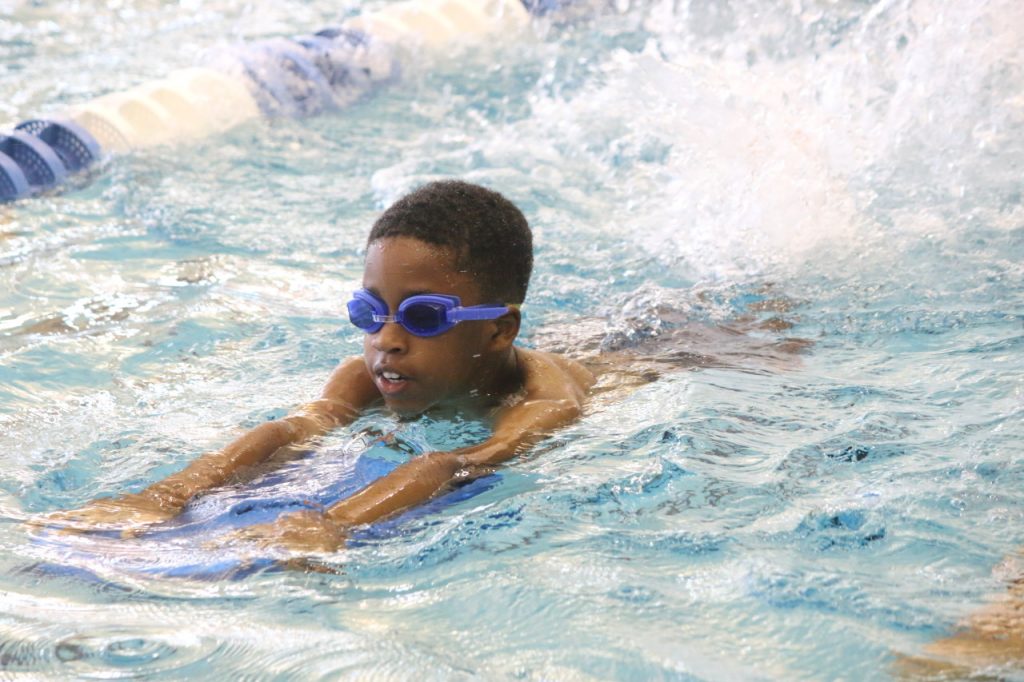To Catch Up During The Summer, Kids Need Robust Programs

Sirocus Barnes (center) is the site program director for Horizons Atlanta at Georgia Tech.
Horizons Atlanta
The topic of the “summer slide” seems to come up every year. Research, conducted in the 1970s and ’80s, shows students lose on average about a month’s worth of reading skills and two months’ worth of math over the summer. The decline is more significant for low-income students.
But new research questions whether the summer slide is as serious as experts once thought. Recently, Paul von Hippel tried to replicate that research and couldn’t.
“I didn’t believe it at first,” he said. “The new data do not look anything like the data from the 1980s.”
Von Hippel, an associate professor at the LBJ School of Public Affairs at the University of Texas in Austin, said he used to be a big believer in summer learning loss, but after doing his own research his faith has been shaken. He said his results don’t mean the summer slide isn’t real; it just makes researchers like him less sure of how much of a problem it is.
“I think the right way to sell a summer learning program is, ‘If your kid is behind, a summer learning program is a great chance for them to catch up.’”
Paul von Hippel, an associate professor at the LBJ School of Public Affairs at the University of Texas in Austin
“For example, the question of how much students lose on average over the summer is something that I don’t have a clear read on,” he said.
Researchers do agree that there is an achievement gap between high- and low-income students. Early research on the summer slide indicated summer learning loss accounted for two-thirds of that gap. Von Hippel is skeptical of that.
“I think we can be more certain it does not appear that the summer vacation contributes much to the achievement gap at all,” he said. “I think we need to stop saying that two-thirds of [the] eighth-grade achievement gap is due to summer learning [loss].”
Even if the slide is minor, von Hippel said, that doesn’t mean summer programs are a waste of time.
“I think the right way to sell a summer learning program is, ‘If your kid is behind, a summer learning program is a great chance for them to catch up,’” he said. “And if your kid’s not behind then a summer learning program is a great chance for them to expand their skills into a new area.”
A New Kind of ‘Summer School’
There are plenty of traditional summer school programs, where kids review skills taught during the year. Some students are required to attend those if they have to retake Georgia’s state test.
But, increasingly, summer programs are stretching beyond the traditional school model. They seek to engage students with different themes, like Science, Technology, Engineering and Math (STEM) or Science, Technology, Engineering, Arts and Math (STEAM).
Horizons Atlanta, for example, is a summer learning program that targets kids in need.
“We recruit those that are free and reduced lunch program participants,” Horizons Atlanta’s executive director, Alex Wan, said. “Each incoming class of rising first graders we want at least two-thirds of each class to be performing below grade level on literacy assessments.”

The summer program is a nonprofit that serves students from Fulton County and Atlanta Public Schools. It has nine locations in the metro Atlanta area. Each has a different focus.
The location on Georgia Tech’s campus concentrates on STEAM. Kids learn to code and work on projects centered on a driving question.
On one Wednesday morning, a class of 15 soon-to-be second graders was learning about how drought can affect animals. Their teacher, Donyelle Moore, gave them an assignment after the lesson.
“There has been a drought and the animals are on able to get their water in the way that they usually get it,” she told them. “You have to create an alternative water supply for your animal. Put your thinking caps on.”
The kids went back to their tables and began working. Moore had two other adults in the room to help her—a teaching assistant (paraprofessional) and a high school volunteer. Horizons maintains a 1:5 teacher/student ratio in all of its classes.
“With that many hands, we’re able to make great strides,” Moore said. “I remember last year, my students grew 12 percent in their…Star Early Literacy test [which] is what we use to see where they are and what they need when they come in. [The growth occurred] in six weeks.”

The program hires certified teachers, like Moore, to lead summer classes. Families have to commit to returning each summer so their kids can make progress over time. Students are tested at the beginning and end of the summer to see if they’ve made progress. Wan said data show the program has long-term effects.
“…things like school attendance improved school attendance for horizons kids versus non-Horizons [students], program attendees’ [have higher] GPA[s], stronger assessment scores,” Wan said.
Teaching Skills That Stick
Horizons Atlanta’s first site at Holy Innocents Episcopal School opened 20 years ago. Wan said regardless of whether the summer slide is profound or trivial, the program is working the way it’s intended.
“Our program is taking kids and providing them with two to three months of academic growth during the summer,” he said. “So within that time span it’s important that whether there is summer slide or not, even if they were just to stand still, we’re doing better than that and we’re helping the communities that we serve in that way.”
The program is intense, but students seem to like spending their summers here. Quincy Durham, a soon-to-be fourth grader, really enjoyed learning about recycling.
“We learned how to make a lot of different things using plastic, and we only learned, like, a few little things about plastic in school,” he said. “Here…we use the word[s] reduce and reuse and recycle. And today, we made kites out of plastic.”
That’s the kind of interest science teacher Eric Koonce wants to inspire in his students. Koonce, who teaches grades 6-8, says he makes his lessons relevant to students’ lives.
“They always ask that question, ‘Why do we have to learn this?’” he said. “’Why is this important?’ And I just hope that when they leave, especially with this Global Warming, Climate Change, I hope they actually understand that this ‘going green’ isn’t just a fad. It’s something that necessarily has to happen.”

Academics may take center stage, but the program also incorporates other skills, like coding and swimming. Every Horizons student learns to swim. It’s not just recreational. Drowning is a leading cause of death for children and is more of a risk for lower-income kids.
Sirocus Barnes, the site program director at Georgia Tech, said swim skills are tested too.
“[Students] take a pre-test for swimming at the beginning of the summer,” he said. “Then they’re divided into swim groups and then we do a post-test as well. So we are able to track their swimming growth over the summer.”
The driving goal of the program is to give kids skills that stick and to ensure the only summer slide these kids will see is the one at the Georgia Tech pool.








